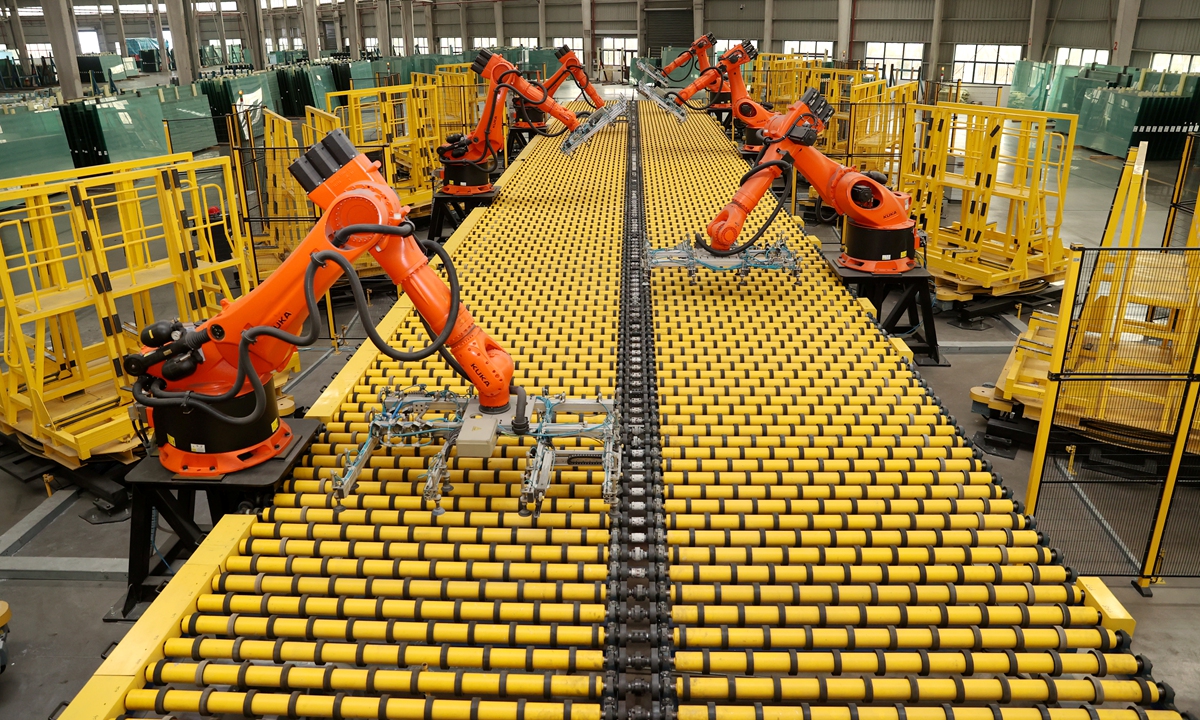Manufacturing, services continue to improve as January’s comprehensive PMI rises to 50.9

A robotic arm picking system operates in an orderly manner at a local factory in Suqian, East China's Jiangsu Province, on January 17, 2024. As the year begins, major enterprises in the city are working at full capacity to meet orders, achieving a good start to the year. Photo: VCG
China's comprehensive purchasing managers' index (PMI) came in at 50.9 in January, up from 50.3 in the previous month, indicating an overall stabilization in manufacturing and services activities amid increased momentum of domestic demand, data from the National Bureau of Statistics (NBS) showed on Wednesday.
A reading above 50 indicates expansion, while one below reflects contraction. In January, the manufacturing PMI came in at 49.2, an increase of 0.2 points from 49 in December 2023, reversing a three-month declining trend, NBS data showed.
"The manufacturing PMI showed marginal improvement in January and non-manufacturing activities saw faster expansion, which jointly pushed the comprehensive PMI higher. It shows that economic activity is gaining pace, with strengthening momentum of domestic demand," Zhou Maohua, a macroeconomic analyst at Everbright Bank, told the Global Times on Wednesday.
However, the manufacturing PMI remained in the contraction zone, showing that the recovery of domestic manufacturing demand remained low, Zhou said, calling for stepped-up macro policies to boost a rebound in effective demand and promote the benign circulation of supply and demand.
According to the NBS, the production index, a sub-index of the manufacturing PMI, stood at 51.3 in January, rising to a nearly four-month high, indicating that manufacturing activity started to gain pace for growth.
In terms of enterprise size, the PMI for large enterprises was 50.4, up 0.4 points from the previous month to be within expansion territory. The PMI for medium-sized firms came in at 48.9, up 0.2 from the previous month, whereas that for small enterprises was 47.2, edging down 0.1 points month-on-month, NBS data showed.
January's new order index was 49, up 0.3 from the previous month, indicating that market demand for the manufacturing industry slightly improved.
There may be some fluctuation in manufacturing activities with the approach of the Spring Festival holidays. For the full year of 2024, although there are uncertainties related to overseas demand, domestic demand is seeing a stable recovery and the supply structure of the sector continues to improve, which will lead to an overall improvement for the country's manufacturing sector, Zhou said.
In January, the non-manufacturing PMI stood at 50.7, up from 50.4 in December, which means that the non-manufacturing industry continued to expand, the NBS data showed.
China's overall economic situation saw an improvement in January but the finished goods inventory - an index that reflects the momentum of the manufacturing sector - declined for the first time since June 2023, reflecting that domestic demand remains weak, Wen Bin, chief economist at China Minsheng Bank, told the Global Times on Wednesday.
Chinese policymakers have stepped up measures to bolster the economy. A State Council meeting held on January 22 pointed out that efforts will be made to enhance the innovation and coordination of policy tools, consolidate and strengthen the trend of economic recovery, and promote the stable and healthy development of the capital market.
Pan Gongsheng, governor of the People's Bank of China, said at a press conference on January 24 that China will cut the reserve requirement ratio by 50 basis points from February 5, which is expected to inject 1 trillion yuan ($141 billion) in long-term liquidity.
Wen said that monetary policy will be appropriately strengthened in 2024, with more measures to expand domestic demand and ensure a stable economic recovery.


